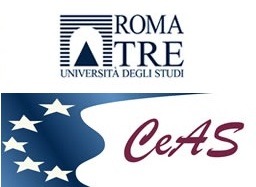 On 9-11 May 2012 the University of “Roma Tre” will host an international conference on the current issues and perspectives of European Private Law, organized by the Jean Monnet Centre of Excellence “Altiero Spinelli” (CEAS): “The Making of European Private Law: Why, How, What, Who”. Here’s the programme (available for download on the registration page):
On 9-11 May 2012 the University of “Roma Tre” will host an international conference on the current issues and perspectives of European Private Law, organized by the Jean Monnet Centre of Excellence “Altiero Spinelli” (CEAS): “The Making of European Private Law: Why, How, What, Who”. Here’s the programme (available for download on the registration page):
Wednesday, 9 May 2012
(Venue: “Roma Tre” University – Aula Magna Rettorato, Via Ostiense 159)
Registration (16,00-16,30)
Opening session (16,30 – 16,45)
- Guido Fabiani, Rector, “Roma Tre” University
- Savino Mazzamuto, Secretary of State, Ministry of Justice, “Roma Tre” University
The Europeanisation of private law: problems and perspectives (16,45-18,30)
Chair: Antonio Tizzano, European Court of Justice
Panelists:
- Ole Lando, Copenaghen Business School
- Bénédicte Fauvarque-Cosson, “Panthéon-Assas” University (Paris II)
- Guido Alpa, “Sapienza” University of Rome
- Pietro Rescigno, “Sapienza” University of Rome
– – – – – –
Thursday, 10 May 2012
(Venue: “Roma Tre” University – Aula Magna Rettorato, Via Ostiense 159)
The ‘legal basis’ of European private law in the light of the EU constitutionalisation (09,30 – 11,30)
Chair: Luigi Moccia, “Roma Tre” University
Panelists:
- Mads Andenas, University of Oslo
- Martijn Hesselink, University of Amsterdam
- Hans Micklitz, European University Institute, Florence
- Christiane Wendehorst, University of Vienna
The ‘instruments’ for implementing European private law (11,45 – 13,30)
Chair: Angelo Davì, “Sapienza” University of Rome
Panelists:
- Hugh Beale, University of Warwick
- Fabrizio Cafaggi, European University Institute, Florence
- Reiner Schulze, University of Münster
- Verica Trstenjak, European Court of Justice
The relationship between European private law and the international unification of private law (15,30 – 17,30)
Chair: Joachim Bonell, “Sapienza” University of Rome
Panelists:
- Fernando Gomez, “Complutense” University of Madrid
- Morten Fogt, Aarhus University
- Sergio Marchisio, “Sapienza” University of Rome
- Renaud Sorieul, UNCITRAL
European consumer law and its consolidation (17,45 – 19,30)
Chair: Diego Corapi, “Sapienza” University of Rome
Panelists:
- Luc Grymbaum, “René Descartes” University (Paris V)
- Hans Schulte-Nölke, University of Osnabruck
- Simon Whittaker, Oxford University
- Vincenzo Zeno-Zencovich, “Roma Tre” University
– – – – – –
Friday, 11 May 2012
(Venue: Sala “Pio X”, Via Borgo S. Spirito 80)
European property law: issues and projects (09,30 – 11,30)
Chair: Adolfo Di Majo, “Roma Tre” University
Panelists:
- Ulrich Drobnig, Max Planck Institute for Private Law, Hamburg
- Brigitta Lurger, University of Graz
- Sjef van Erp, University of Maastricht
- Francesco Paolo Traisci, University of Molise, Campobasso
European contract law: issues and projects (11,45 – 13,30)
Chair: Guido Alpa, “Sapienza” University of Rome
Panelists:
- Eric Clive, University of Edinburgh
- Marco Loos, University of Amsterdam
- Jerzy Pisulinski, University of Warsaw
- Anna Veneziano, University of Teramo
Common European Sales Law: the Commission proposal and the role of stakeholders
15,30-17,00
- Andrea Zoppini, Secretary of State, Ministry of Justice, University “Roma Tre”
- Luigi Berlinguer, Member of the European Parliament
- Mihaela Carpus-Carcea, European Commission, DG Justice
17,15-19,00
- Ettore Battelli, “Roma Tre” University, Unioncamere stakeholder
- Oreste Calliano, University of Torino, CEDIC director
- Antonio Longo, Consumers’ representative, EESC member
Each session will be ended by discussion. Working language will be English (French allowed): no simultaneous translation will be provided. Conference works will be video-recorded and made available on CeAS website.
 On March 15th, the European Court of Justice ruled again on the defendants with unknown domicile in
On March 15th, the European Court of Justice ruled again on the defendants with unknown domicile in 
 The law school of the Paris Institute of Political Science (Sciences Po) is seeking to recruit
The law school of the Paris Institute of Political Science (Sciences Po) is seeking to recruit